Sailing details
On this page you will find some more 'technical' details related to our routes in general, as well as some details regarding your organization.
Trip type
One-way - All of our 'Greek routes' are one-way routes. Those are different from standard circular cruising routes, which results in our embarkation and disembakartion ports NOT being the same. This provides an opportunity to those interested in discovering Greece a bit more to do so, as our sailing trip can nicely be combined with a land stay, whether before or after cruising.
Private - Whether you have the whole yacht for your friends or/and family, or the crew is gathered on a 'cabin charter' system, the organization remains 'private', as the skipper and organizers are giving the final approval for someone to join and board. When crew is unknown to each other, our objective is finding similar minded people and interests, and thus making the best possible balance.
Cabin charter booking - Unlesss the whole yacht being chartered by a family or group of friends, the bookings are done on a shared cruise system where you either book 'one spot' or a 'cabin for 2 people'. Cabin charters are the easiest solution for single/solo travellers, couples or small groups of friends, as they do not have to worry about organizing and filling the whole yacht. Furthemore, as there is a tendency of easily bonding on boats, meeting unknown travellers and sharing experiences together very often results in excellent new friendships.
Theme - Although our routes do not have any specific or particular program, a common theme to all of them can be found: 'Easy cruising and DIY exploration of Greece'.
Difficulty level - No previous sailing experience is needed for being part of our trips. All our routes are in the 'low to medium' difficulty level range (2/5). The reason for the eventual and occasional 'medium range' is because some routes might have longer sailing legs (one day on Route 1, for example), while some might occasionally face a bit more winds in the Cyclades (Routes 3 and 4, for example). Otherwise, nice & easy sailing is expected, with beautiful summer weather, as our passage in the Cyclades is before the Meltemi winds start blowing.
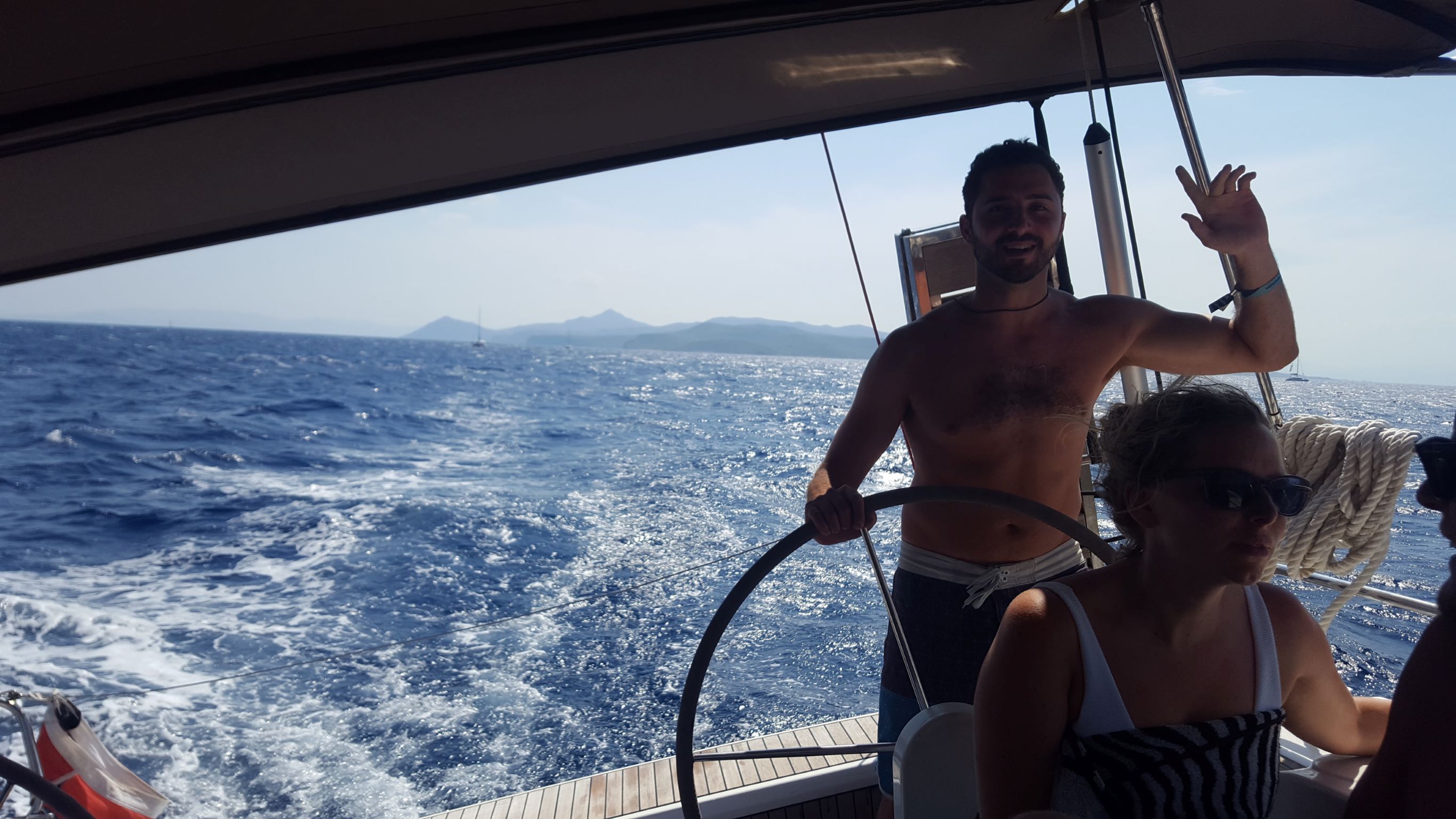 Crew enjoying newly discovered helm position...
Crew enjoying newly discovered helm position...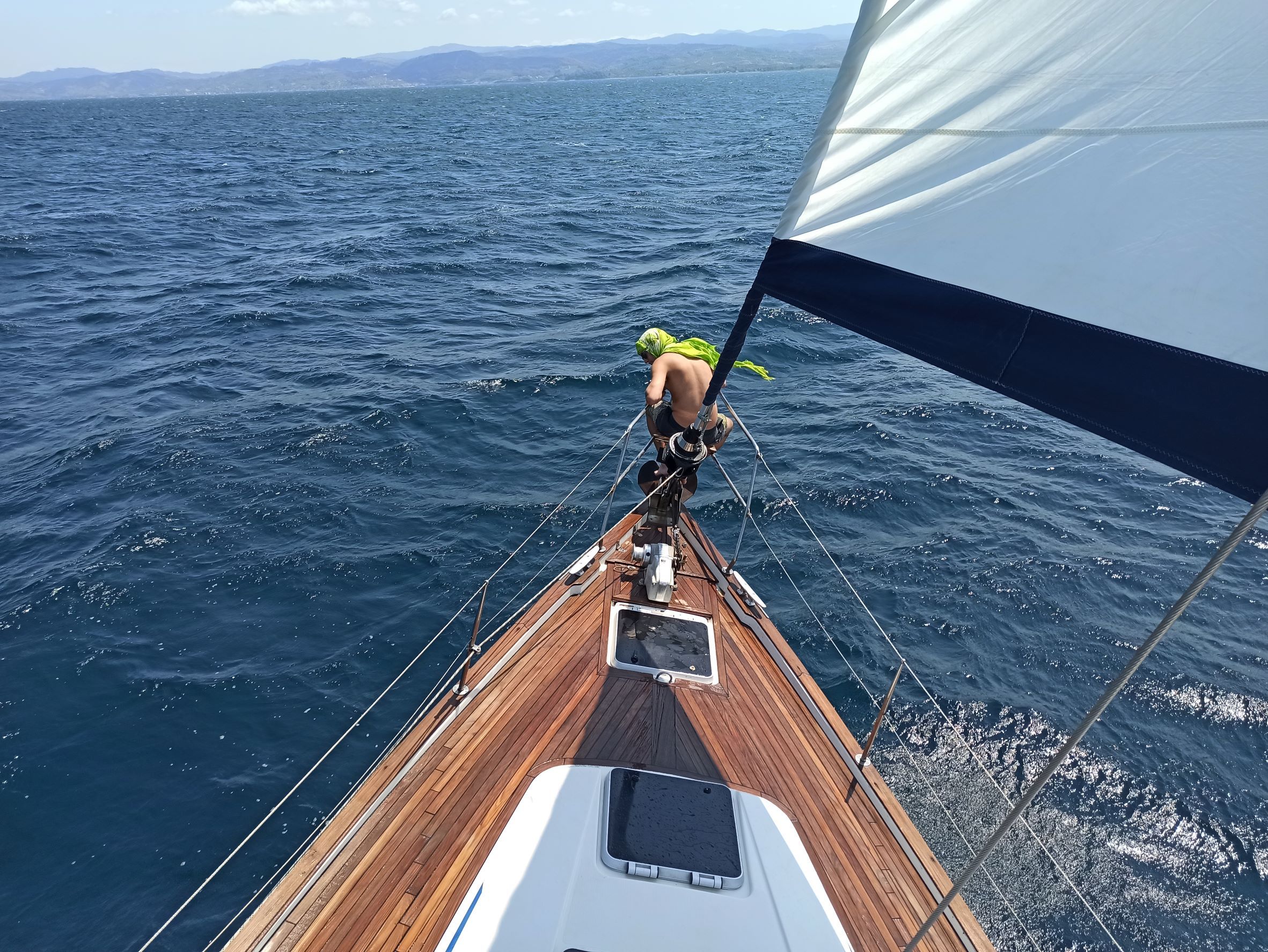 ...or not sharing the good old spot
...or not sharing the good old spotThe itinerary
Our preplanned itineraries include numerous 'must-see' stops, like beaches, bays, villages, historic and cultural sites...However, like any other sailing trip, it is weather dependent. Safety and comfort being the main reasons, so we will permanently verify the wind conditions, and based on that, if necessary, adapt our journeys, courses, passage plannings, ports and achorages. Therefore, being flexible about our initial route and schedule/time is part of the sailing and exploration program mindset. Mornings and late afternoons will be the moments when decisions upon next steps will be confirmed.
In addition, the sailing plan can also be customized based on crew interests, interesting places or local activities that we encounter on the way. After the first day or so on board, everybody will have a more clear idea around what kind of pleasures the next days should be centered, at what paste, leading into a real DYI tailored made holidays.
Regarding the general daily plans... we sail to our new destination each morning, which usually takes between 2 and 4 hours, as the islands are relatively close together (note that some days we will have only around 1 hour of sailing, while some legs will be longer than the average. You will find the details in every specific route). During our island hopping sailing, there is a choice of participating in manouevers (navigation, helm, sail trimming...), or just relaxing, reading a book, sunbathing on the teakwood deck, sleeping, having a snack... or singing. Depending on the agreed daily sail plan, if the leg is a bit longer, we could make a swim stop somewhere on the way, dropping the anchor in a sheltered bay, for example, or in open space, enjoying diving in beautiful, deep blue waters. Or maybe even have lunch there, in open waters, slowly drifting...
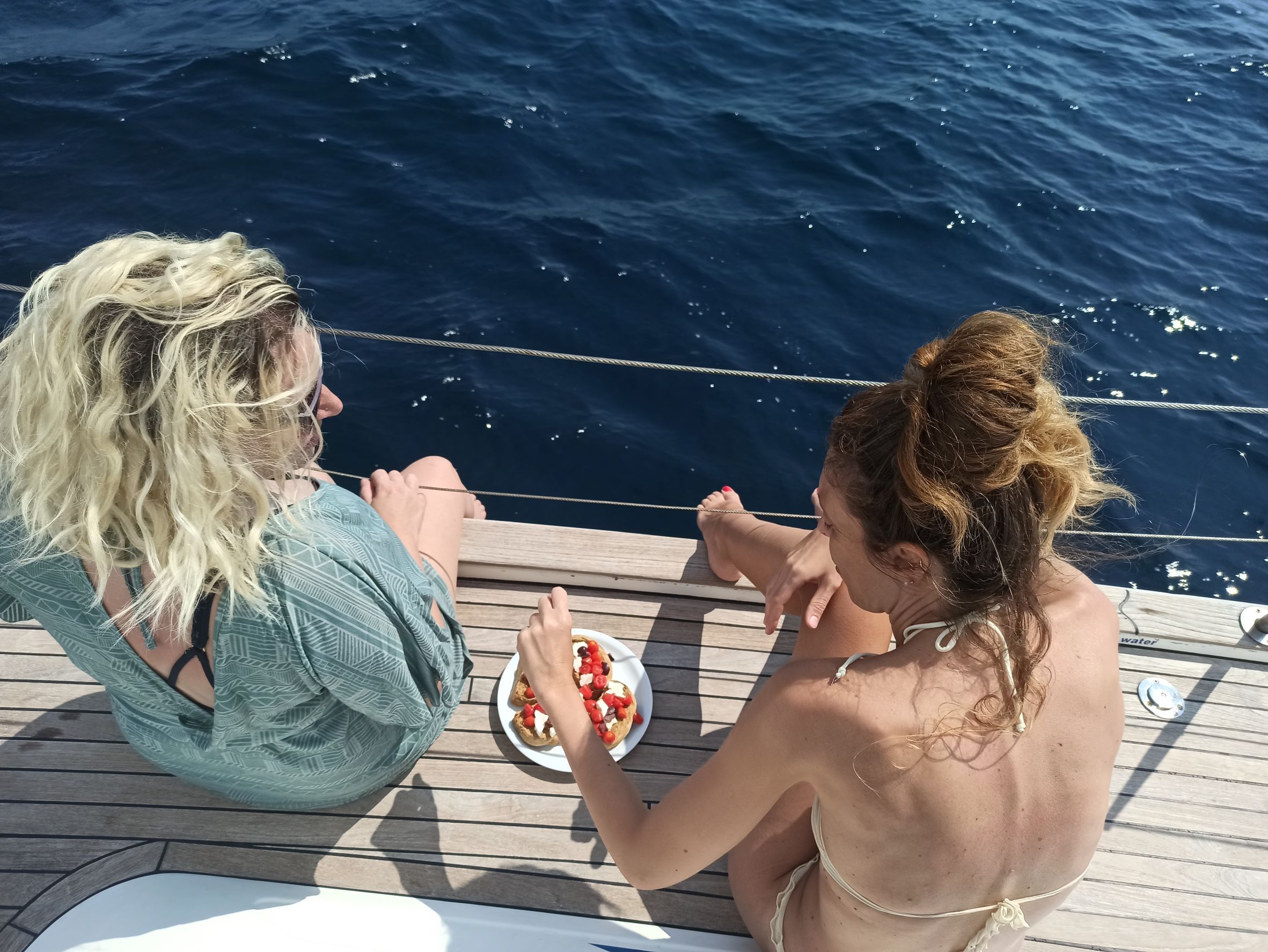 Deck snack while island hopping
Deck snack while island hopping Once we arrive at a new haven, unless we have an organized program for that afternoon/evening (dinner, visit...), there is no group obligation of any kind. So staying on the yacht, going to the beach, shopping, or just exploring the village or even the whole island...the choice of your favourite activity is completely up to you.
Expenses
The overall price is an 'all-inclusive'. It covers everything one might need during a sailing holiday trip, maening all daily running and administrative expenses related to the yacht have been included. Thus, the price comprehends:
- Accommodation in double occupancy cabin
- Towels, sheets & linen
- Food on board (local groceries for breakfast, light lunch, some dinners)
- Drinks on board (bottled water, beer and wine, milk, soft drinks, ouzo...)
- Yacht inventory and equipment
- Yacht insurances
- Security deposits
- Technical water, electricity and fuel supplies
- Port and mooring fees, transit log and tourist taxes
- End cleaning
- Dinghy and outboard engine
- Snorkeling equipment & Stand up paddleboard
Prices are regardless of the number of people on board and relate to one person per berth (Note: The total number of crew is subject to the max number of berths allowed).
What is NOT included - Any specific personal extra expenses are NOT included. Therefore, the price excludes anything like: personal travel or medical insurances, extra linen or towels, evening meals in restaurants, excursions or museums visits, sites entrance fees, land activities, additional services (airport or land accomodation transfers to and from the yacht, for example), car/bike/scooter rentals, any kind of tips or gratuities...
Also, any crew equipment lost or damage is, of course, not icluded and will be charged by the owner (unless we manage to buy and replace it).
It is worth noticing that some additional services could be arranged and booked, so it would come handy if you get informed on time. Sometimes, land luggage storage, airport or hotel transfers, car parking, car/scooter rentals, specific provisioning etc could prove to be very valuable services. Note that during the high season in Greece, due to big demand, one would probably want to book any of those serices a bit in advance.
The yacht
We will be sailing 'Kyknos, a 'Bavaria 50 classic' sailing yacht. She was built in 2000 in Germany, and had a very recent total refit. It is a 15.5 meters (50 feet) long yacht with a heavier keel, which all together makes her very reliable and comfortable to sail, even in choppy or stormy weathers if needed.
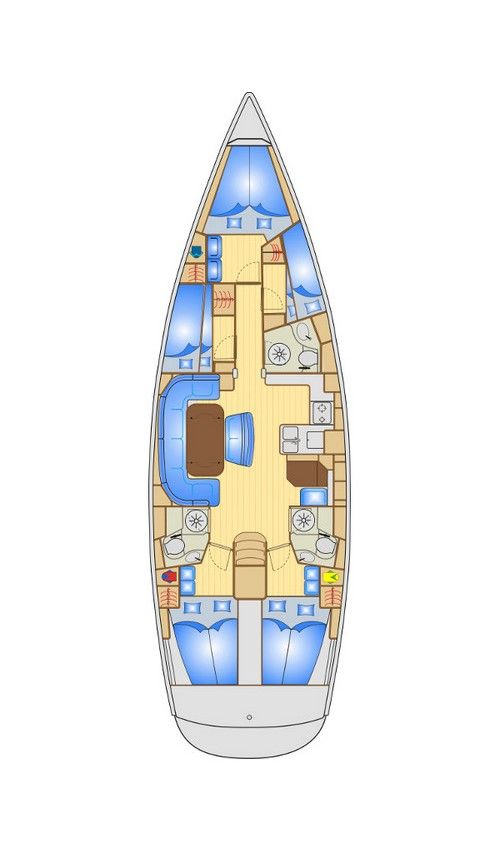 The Bavaria 50 Classic layout
The Bavaria 50 Classic layoutLayout, arrangements and space - The yacht has a spacious common interior area and a fully equipped kitchen (galley), with gaz stove, oven, and fridge.
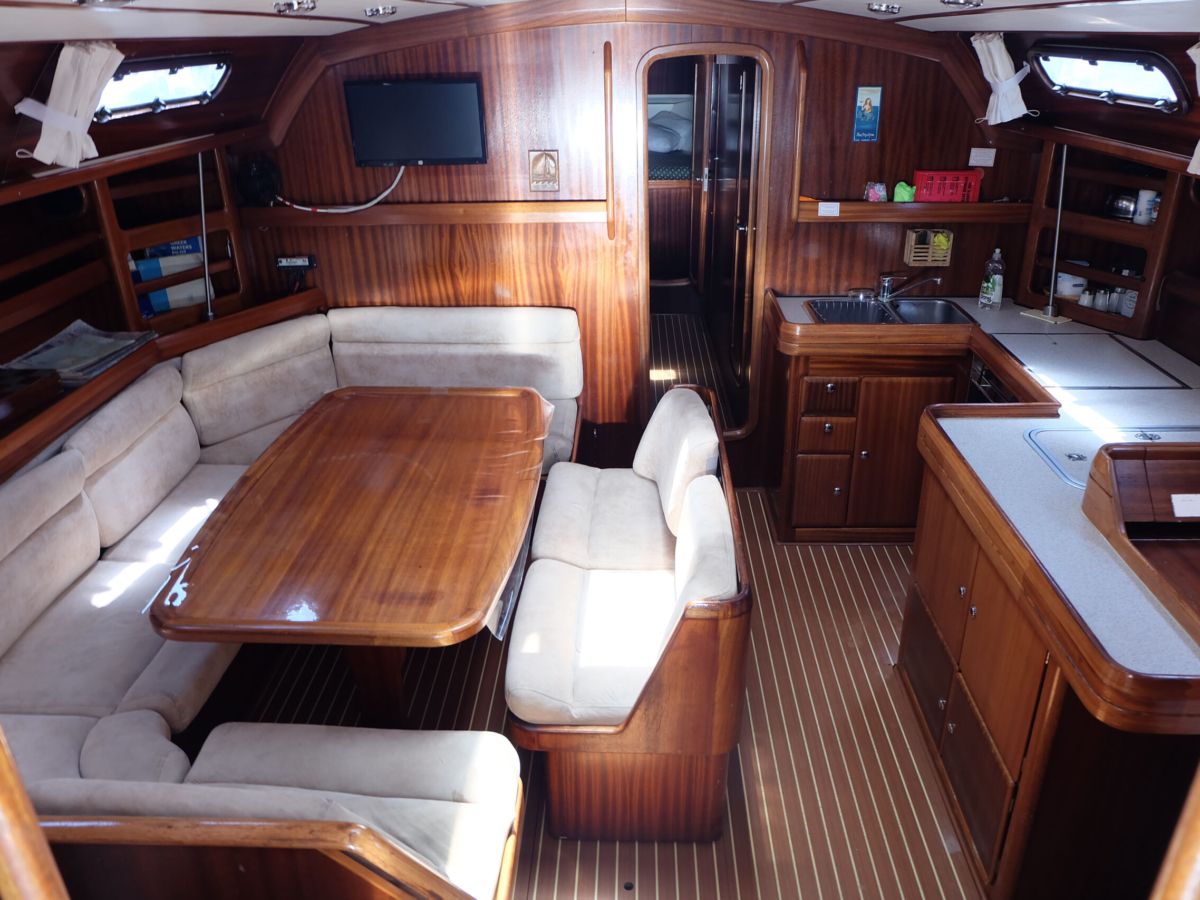 Saloon and galley
Saloon and galleyCabins - The yacht has 4 guest cabins, each for 2 crew. Two of those cabins are double bedded, while two have bunk beds (one berth above the other). Cabins are typical yacht ones, compact, comfortable, and not extremely spacious. Each cabin has small cupboards and closets for clothes, USB outlets and fans. There is a 5th cabin on the yacht, for the skipper and eventual extra staff. Once again, with as little luggage as possible, please...
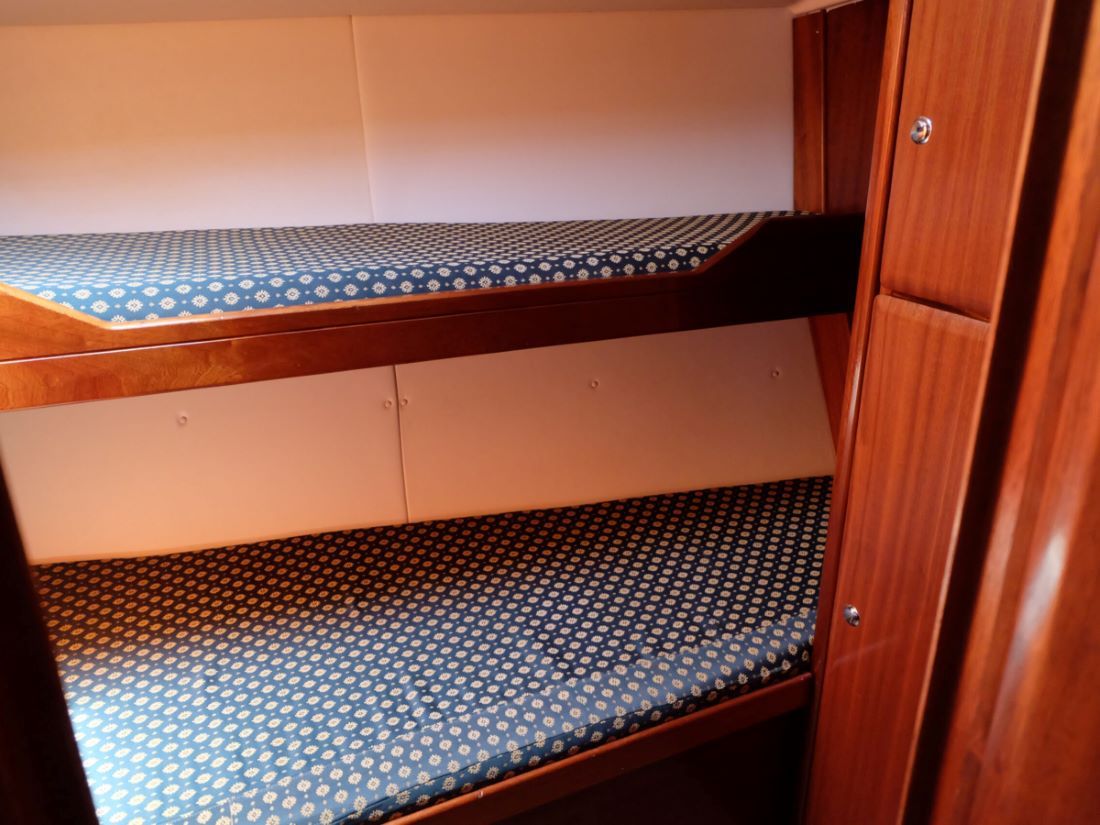 Bunk beds are ideal for solo travellers
Bunk beds are ideal for solo travellersBathrooms - The yacht is equiped with 2 bathrooms for guests (the staff have their own), with fresh and hot water showers, and electric toilets (vacuum flush electric system, pump pressed by a button). Please note that all marine toilets only accept natural waste and anything else placed in the toilet could potentially break or damage them.
Outside - The outside common areas consist of a spacious cockpit, and a teak wood deck. The deck is usually the favourite place for sunbathing, relaxing and enjoying. Plenty of space for a hammock there too...There is an extra shower outside, at the stern, for rinsing after swimming.
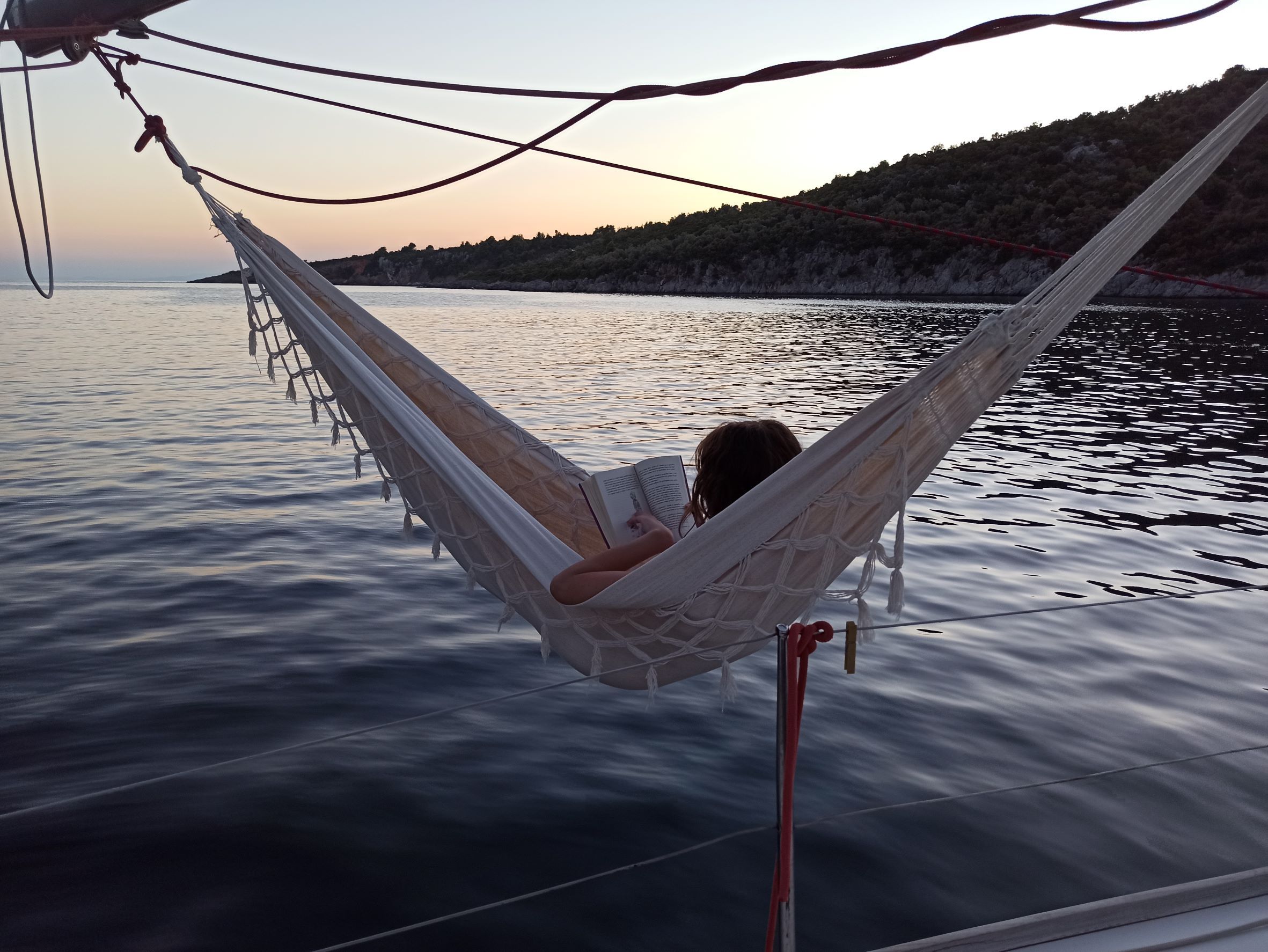 Deck view
Deck viewTechnical details - Among the yacht and equipment specification, worth mentioning would be: 50 ft (15,49 m), teak deck, new sails, furling main sail, autopilot, bow thruster, extra large bimini top, gangway, 78hp Volvo penta engine, 750 lit water tanks, dinghy with outboard... Regarding safety, navigation and tools, the yacht has everything needed, and largely complies with the very extensive Greek legal demands.
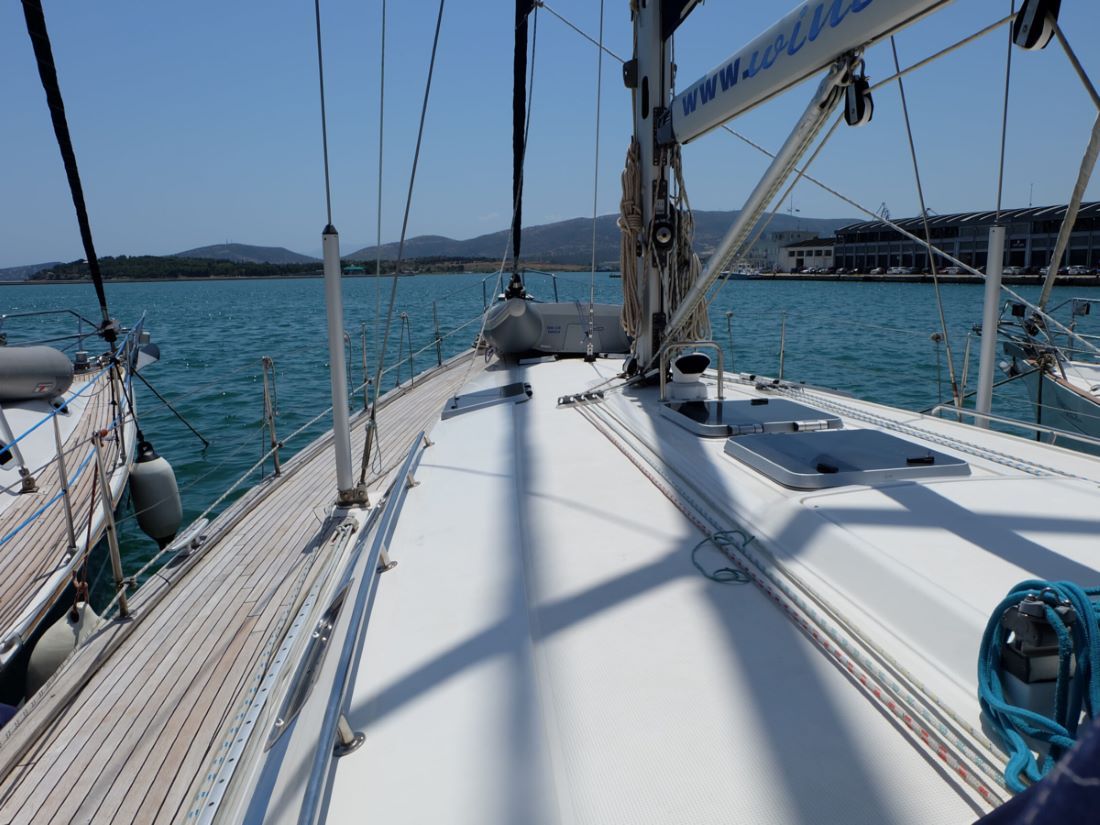 Deck view
Deck viewEquipment - Besides all the standard inventory, and necessary safety, security and life saving equipment (life jackets, first aid kit, flares, emergency life raft, toolbox...), the yacht has some fun accessories too, among which snorkeling gear, a hammock and the guests' preferred toy, the stand-up paddle board.
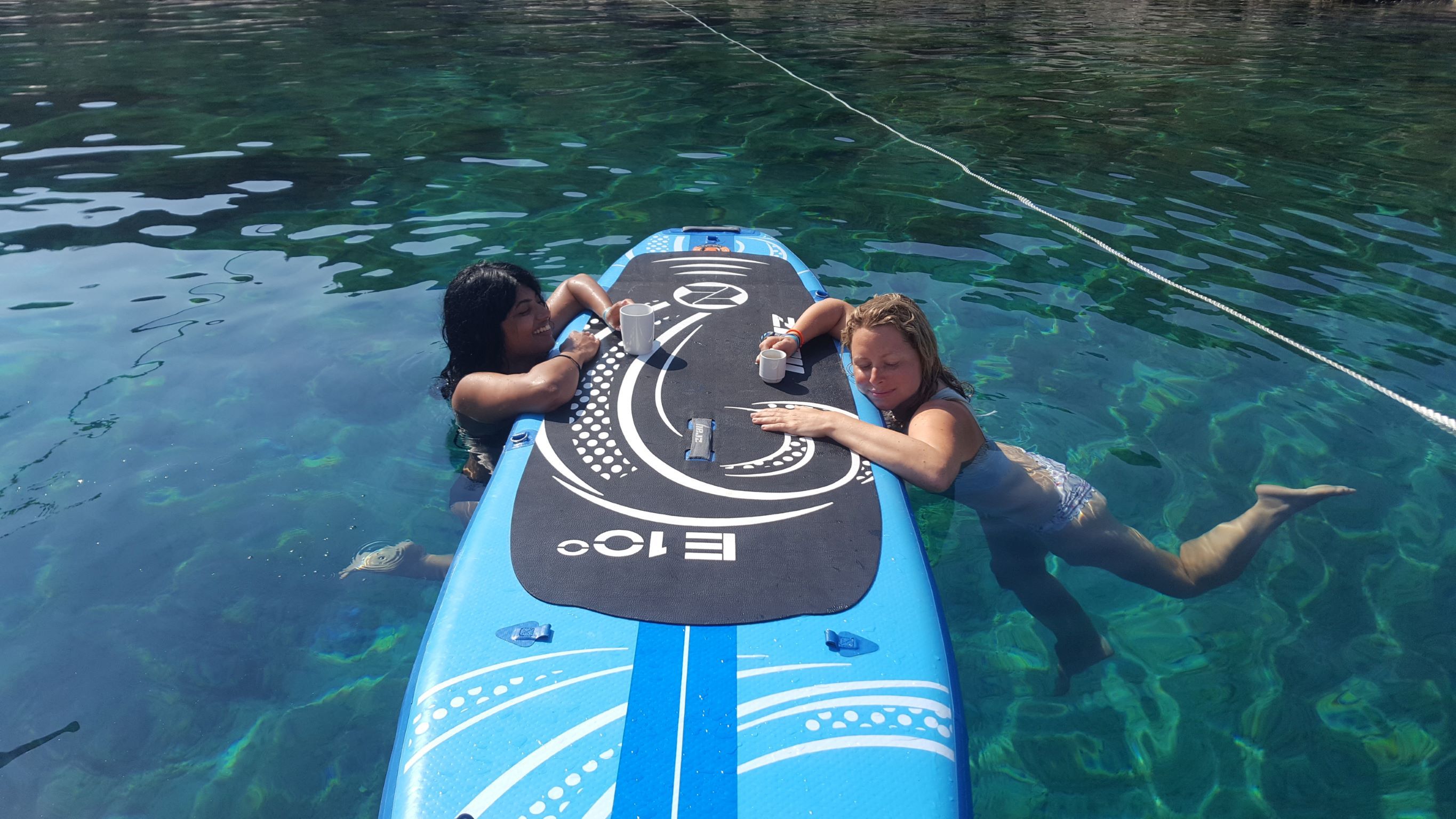 Stand Up Paddle board as the ideal support for a morning coffee...
Stand Up Paddle board as the ideal support for a morning coffee...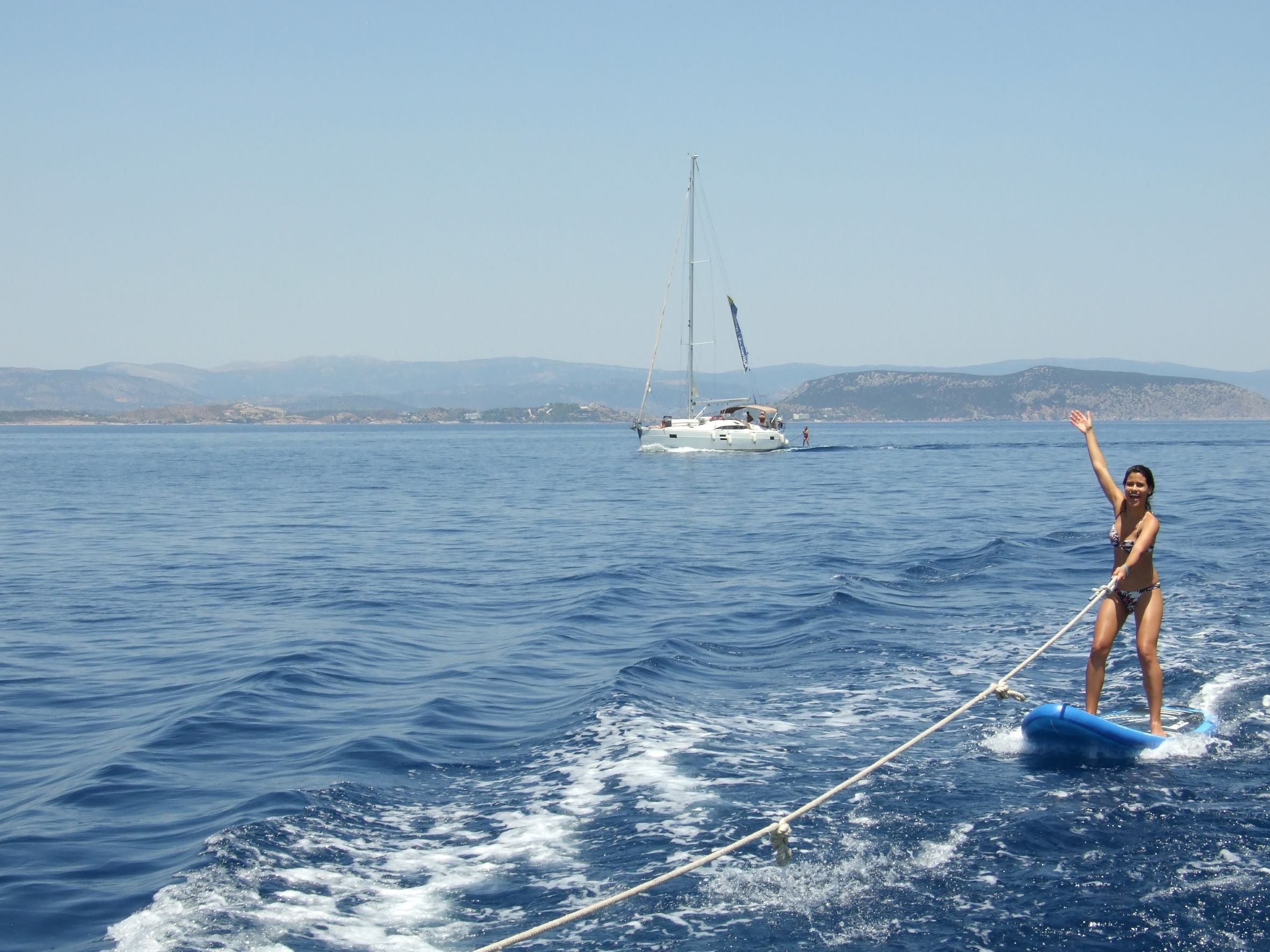 ...or used in other rather non-traditional ways
...or used in other rather non-traditional waysUseful tips
- Voltage in Greece is 220V, used with a 2-pin European plug. All yacht cabins have electrical sockets for use when having shore power, docked in a marina. When underway, if necessary, small electricals (phones, tablets, cameras batteries...) can be recharged on a 12 V supply via a USB converter (the skipper will guide you on how and when to use it).
- WIFI is available everywhere we stop, while local greek networks are covering all the areas we will be sailing
The crew
Guests - Our trip will accomodate up to 8, eventually 9 guests. With the skipper that would make a maximum of 10 people, making it very balanced, crowd wise, for this size yacht.
As mentioned before, if the crew is formed on a 'cabin charter' basics (people coming solo, in couples, or with just few friends) rather than having the whole yacht booked by a family or a group of friends, it is important to make a selection of vacationers with similar mindsets and interests. Meeting this criteria is part of the skipper's planning and organization objectives.
Skipper - The skipper is the planner of the route, and the main decision maker on the way. In addition to navigating the yacht, main duties relate to monitoring the weather conditions and ensuring the safety and pleasure of all crew. Therefore, potential daily route choices that would alter from the initial plan are influenced by safety, in the first place, but also by the interests of the crew.
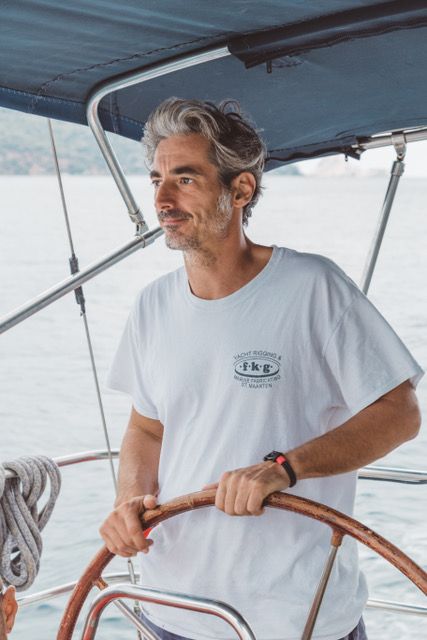
Being the main source of guidance and information, whether related to the yacht and sailing or else, feel free to ask all questions that might interest you. You will probably get also many useful tips and hints. You could get to be shown the ropes and tought the basics in order to participate in the sailing and docking of the boat.
The skipper has his own quarters, the stern starboard cabin, which could eventually be shared with any additional staff, like a cook, hostess, photographer or so.
Extra staff - Would you need extra pairs of hands to make your stay more enjoyable, like a hostess/deckhand, a nanny, a cook, a photographer, or anyone else you might consider useful for your vacation, please make sure to inquire on time on such an option.
The most usual 'additional staff' is the hostess (or host), providing thus the full relaxing and luxurious type of sailing holidays. A hostess is a crew member whose primary duties are keeping the yacht's common areas clean and tidy, running the galley, preparing the meals, serving refreshment drinks, replenishing groceries, assisting the skipper in some manouevers as a deckhand or other daily duties.
Note that if you go to a restaurant with the yacht crew (skipper & hostess), it is common practice to share both the cost of the skippers and hostess meal between the guests.
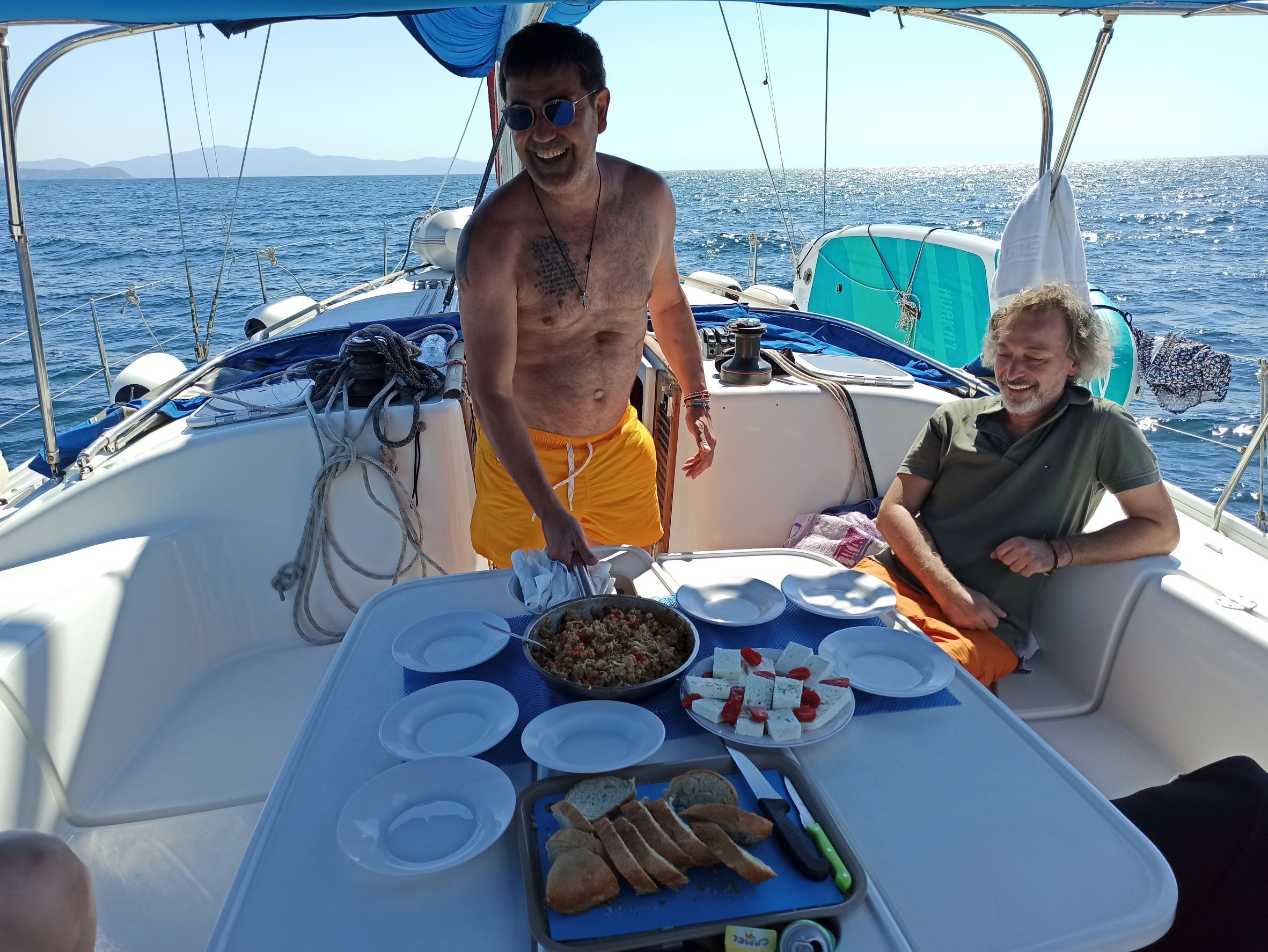 "Dinner is served!" (or sea lunch snack rather...)
"Dinner is served!" (or sea lunch snack rather...)Yacht provisioning
Food - Before setting sails, the yacht will be supplied with the journey's needed provisions, food, fruits, vegetables and drinks. During the trip, as there are several small ports and villages on our route, we can easily refill additional elementary stuff, like bread, milk, yogurt, fresh vegetables, fruits...
Our intention is to use local (if not 'very local') products, so upon booking, when you will be provided with the full list of ensured groceries, if something that you need or prefer is not on the list, please feel free to bring along.
Please, inform us on time if there is a particular diet we should take into consideration (vegetarian, vegan, food intolerances...)
Water - The drinking water on our journey is bottled, and available in every supermarket. So, do not spare it, but rather drink it in large quatities, as dehydration in summer periods and especially on boats, is not so easily noticeable (consider drinking some 1.5-2 lit per day). On the other hand, the technical water, from yacht tanks is to be used rationally (some 750 lit). It is for showering, grocery and dish washing mainly. In case we need more, many ports on the route offer water (on some islands it can be a time consuming, long lasting process, so water is carefully monitored all the time onboard).
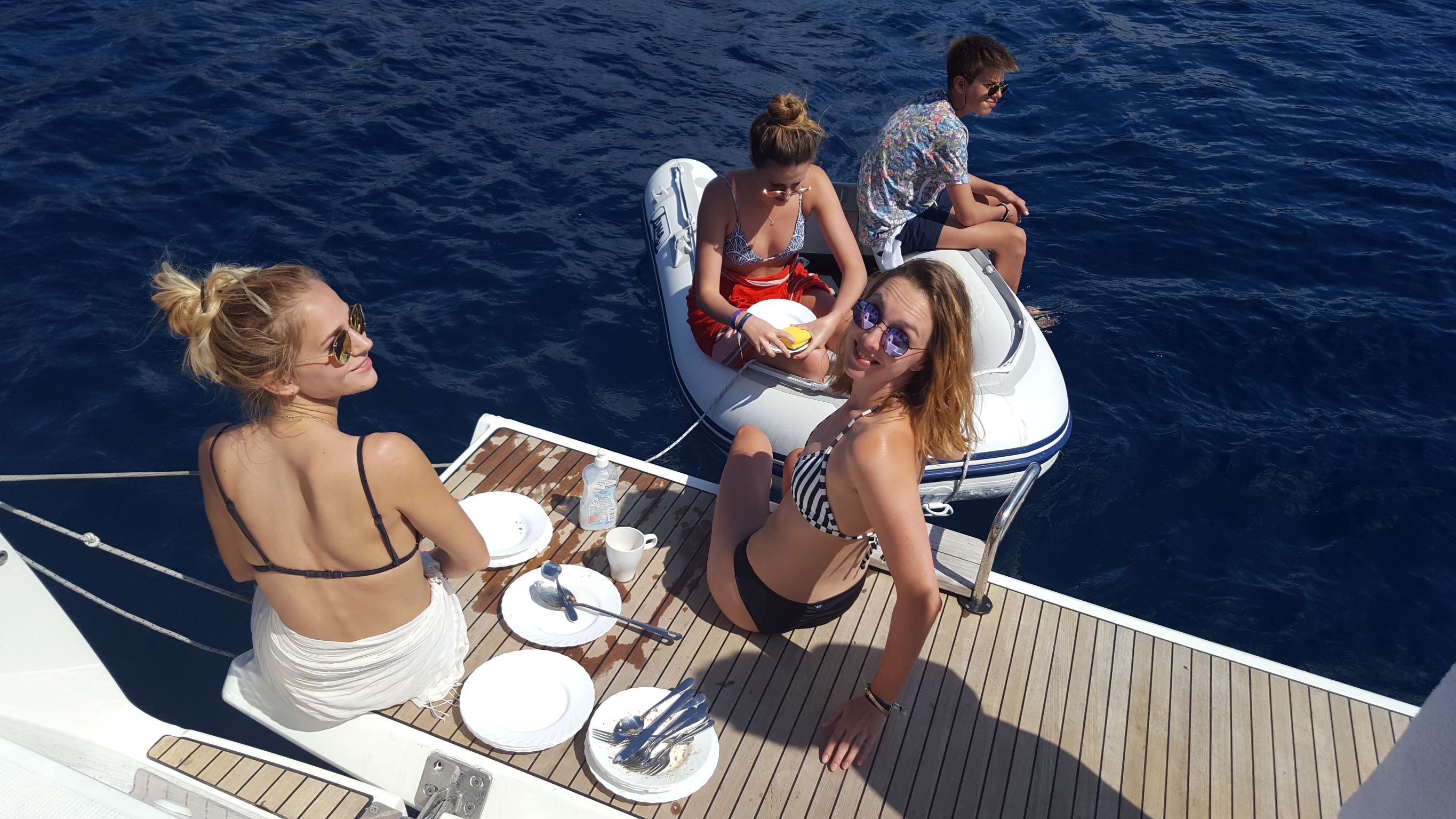 Sometimes, some water can be saved this way...
Sometimes, some water can be saved this way...Crew gathering
The meeting point will be either at the dock, in the front of the yacht, or somewhere very close to it (all crew will be informed in advance, on time, about the exact location). Boarding time, and our leaving the dock soon after, will be between 15 and 17h, so gathering can start anytime from 12-13h. We will have plenty of time for a coffee to get properly introduced to each other, and have the initial sailing plan discussed.
You will, also, be presented with the yacht, your quarters, some details around, and informed on how we are organized with groceries. If any specific food, diet or so is still necessary at that time, that would be a good moment for doing some last minute shopping.
The exact moment od departure will depend mainly on when the port authorities stamp and return our documents, crew list and authorisation to leave (this is done on the day of setting sails). Sometimes during the high season, things are busy, so it could go late in the afternoon, having us waiting in the marina... On the other hand, with a bit of luck, we could depart pretty early, spending more out on the water, and arrive at our first destination in wanted hours.
Note that before embarking your identity document must be checked, as the 'crew list' details (name, date of birth, passport number...) must correspond to the submitted and stamped ones by the Greek maritime port authorities.
Security brief
Before leaving the dock, you will be asked for a bit of your time (and concentration), most probably some 15-20 minutes, so you can be introduced to the basic necessary safety elements. As the subject of safety and security is very vast one in general, way above 15 minutes, during the first few days you will have the opportunity to hear and be shown more of it. Feel free to ask whenever and whatever you want. And as many times as you wish.
Diets, allergies, health states... - During the safety brief talk, it is a good practice to inform the other crew if there are any health particularities, speciffic allergies, dietary requirement, any other intolerances or kinds of potential states, so you are not alone in monitoring and anticipating.
Few tips...
For a more pleasant sailing holiday, here are some simple tips:
Documents - If you have any changes in documents between your booking and setting sail, please, inform us. The official 'crew list', approved by Greek maritime authorities must have matching elements from passports or IDs.
Insurances - Having a personal travel insurance is a common practice for vacationers. It is up to you what it will include, but some of the elements covered could be: injuries, referral to medical correspondents abroad, medical expenses including hospitalization or repatriation, emergency dental care, flight cancellation, baggage loss or damage...There is probably something related to COVID also, as it is a major topic these days, so please check your current govenrment rules on it. More directly with us, sailing holidays, some 'sea search and rescue' option could relate, but that is hardly going to be needed.
Driving licence - If you plan on renting a car, quad or scooter (over 49cc) an International driving licence is mandatory in Greece, if you come out of the European Union. Here is a link for the US licences
Sea sickness - If you are prone to car motion sickness, you should maybe bring your usual medication with you motion sickness medication (pills, patches, or bracelets). There are numerous ways how to prevent the sea sickness state, but you will feel more comfortable knowing your medicines are close to you. Do not exagerate with food and heavy drinks the day before sailing (and that day too, of course), and make sure you are not physically exhausted. If you do, however, start feeling unwell, let the skipper know quickly about it.
Sun protection - With a nice breeze it is very easy not to be aware that you are not protected from the sun. Drinking a lot of water, even if you do not feel like doing it, is one thing you should get used to. Another thing is having a set of protective items, like sunscreen or sunblock lotion, a protection hat, a long sleeve shirt (large linen shirts work the best), and of course, some sunglasses.
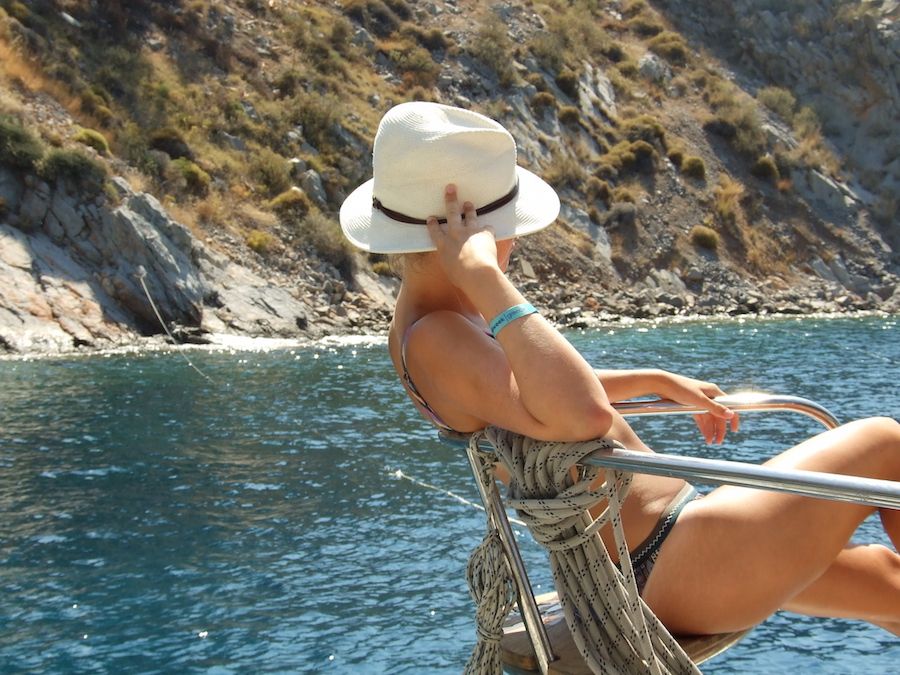 Tanning, while being protected
Tanning, while being protectedAvoiding damages - There are several common mistakes that could be made by new crew, provoking some smaller equipment damage, so make sure to get proper advices from the skipper.
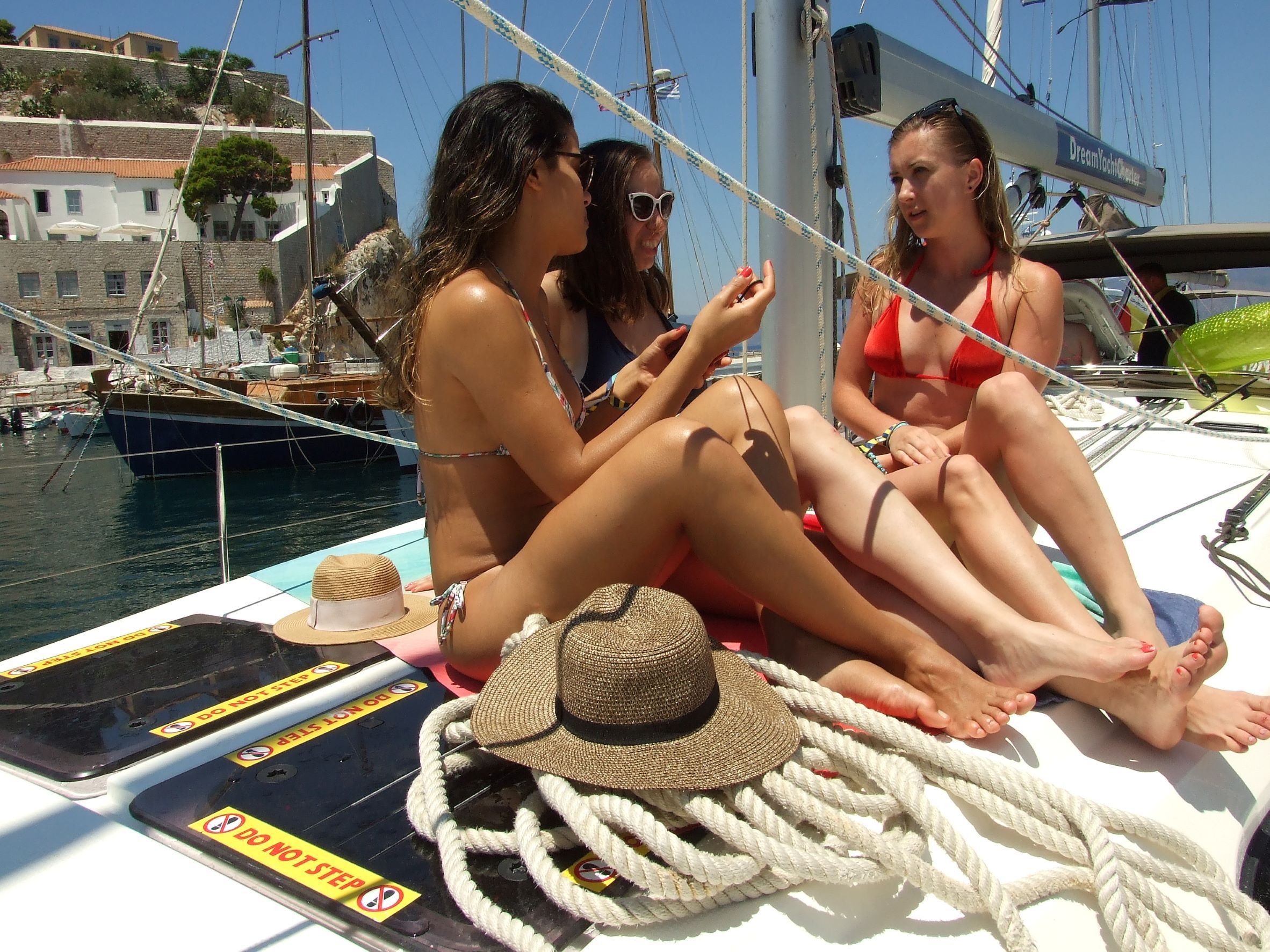 Get used no to step or sit on hatches (windows)! Some yachts have stickers as reminders
Get used no to step or sit on hatches (windows)! Some yachts have stickers as remindersBehaving... - ...on board, in ports, at anchorages. While the skipper will inform you on rules in ports and anchorages (respecting nearby vessels and crew, time and loudness of music...), they are some manners and guidelines that should be common on our yacht so that everybody can enjoy their time aboard. Namely, respecting the tranquility and silence of other guests, keeping things clean and tidy on board, accepting that security dictates everything, avoiding inappropriate or dangerous behaviour and so on.
For example, as you are on holidays, so are the others, and if you still need to make phone calls or work on your computer, try do it discretly; do not turn the yacht into an office and the rest of the crew into colleagues.\
If there is not hostess on board, you will be required to prepare your own food and clean up after yourself. Those are usually rotating duties agreed and organized by the whole group.
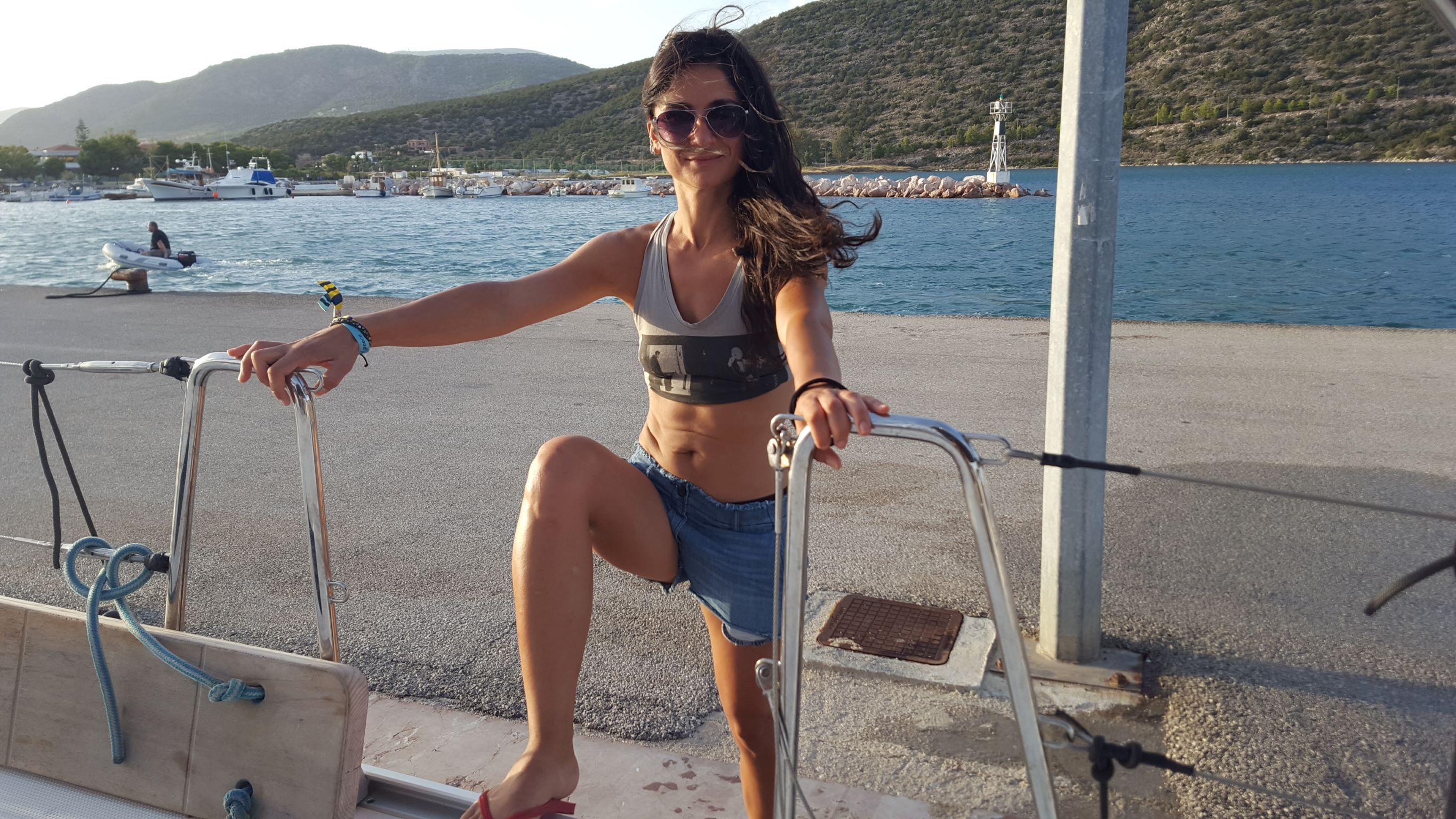 "Permission to step aboard?" is a usual question before being granted of visiting someone...
"Permission to step aboard?" is a usual question before being granted of visiting someone...National park rules - Many islands, places, and national parks in Greece have their specific rules, so please, respect them. Almost everything is 'nature made', so we should keep our environmental footprint, both on land and sea, as low as possible.
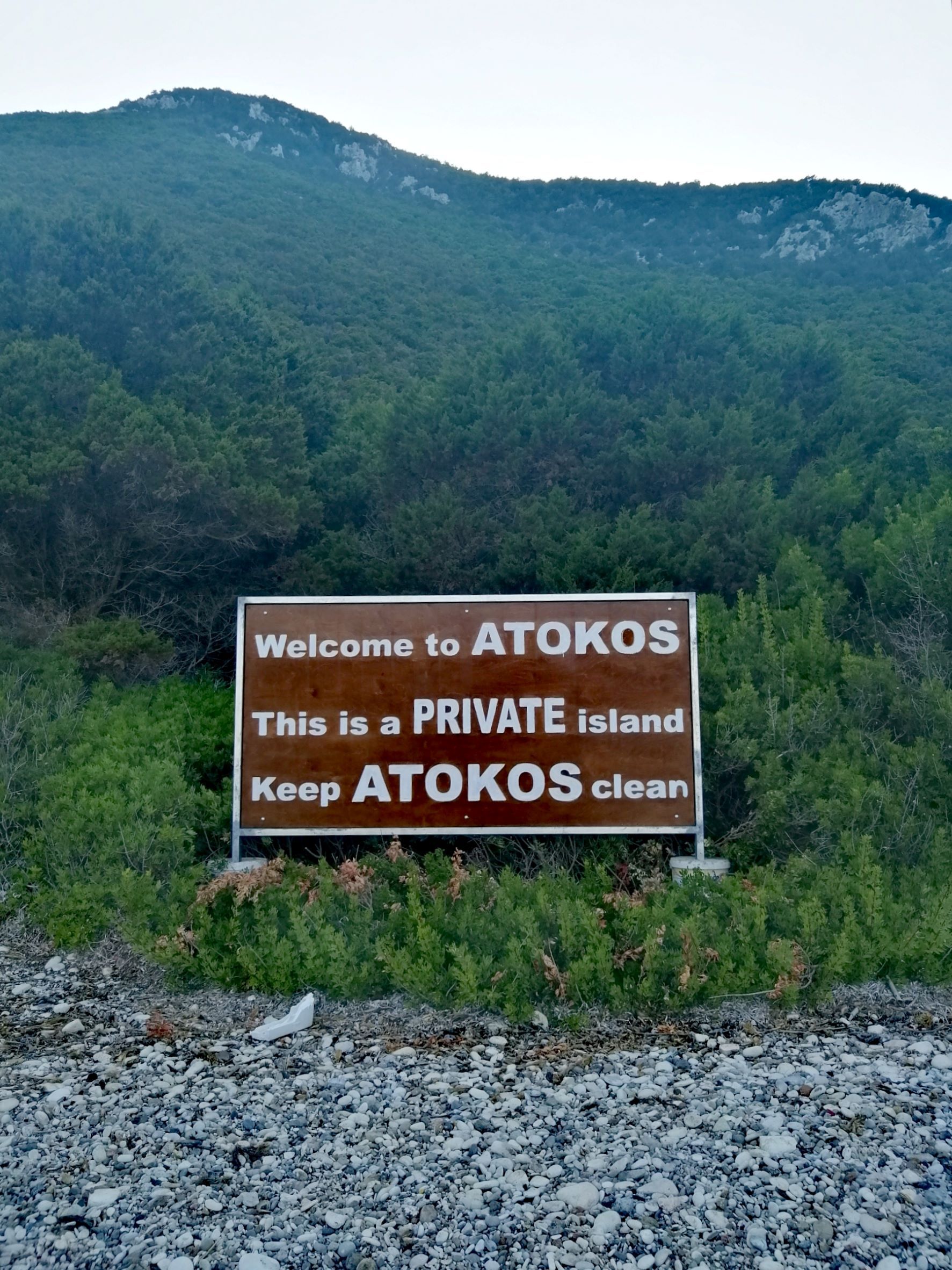 Access to some private islands is allowed, and keeping them clean is what is asked in return
Access to some private islands is allowed, and keeping them clean is what is asked in return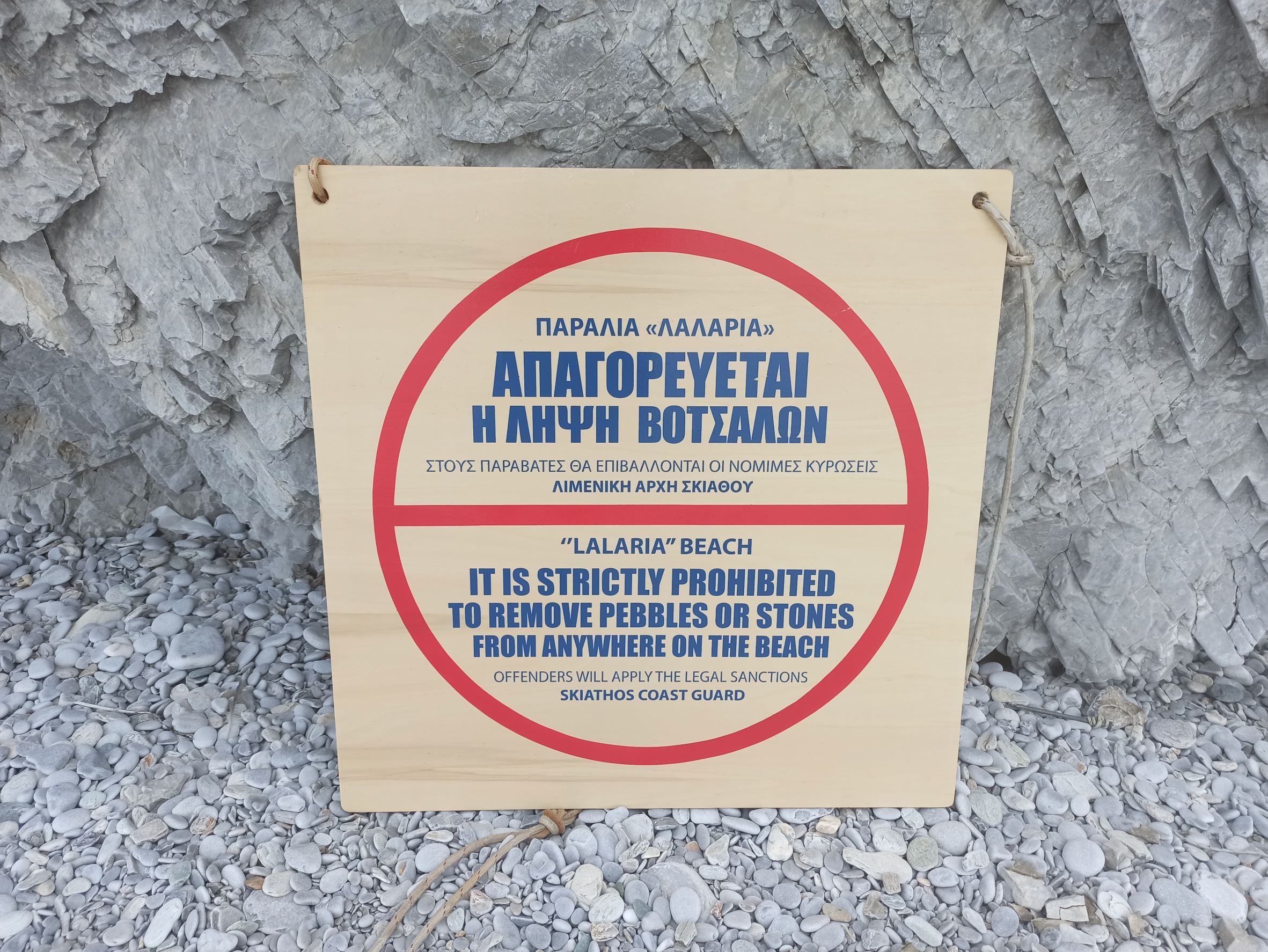 The island of Skiathos not willing to have its famous beach slowly disappearing
The island of Skiathos not willing to have its famous beach slowly disappearingLuggage - In the name of the skipper, please, try to have soft, foldable bags instead of hard suitcases if possible! Once your clothes put in the cupboards/lockers, empty soft bags (frameless backpacks, soft sided bags...), can be folded or rolled and stored under the berths, so you can have full space in your cabin. The space in a yacht cabin is always limitted, the space under the berth very small, and as the yacht has no extra storage space, you might end manouevering a rigid suitcase on and off your bed all the time. And that can be rather burdering...
Do not overpack! As a general rule, during the sail journey, you really do not need a lot of clothes (think of the size of a hand luggage that you can bring with you on a plane). You will mainly be wearing beach or casual comfortable clothes, and occasionably being fashionable in the evenings, for your city exploration or waterfronts walks... So, pack light and, again, no hard-case luggage!
What to pack? - You probably already have an idea of what is to be in your bags among your travel, beach and casual clothes, but here are some useful tips you could take into consideration:
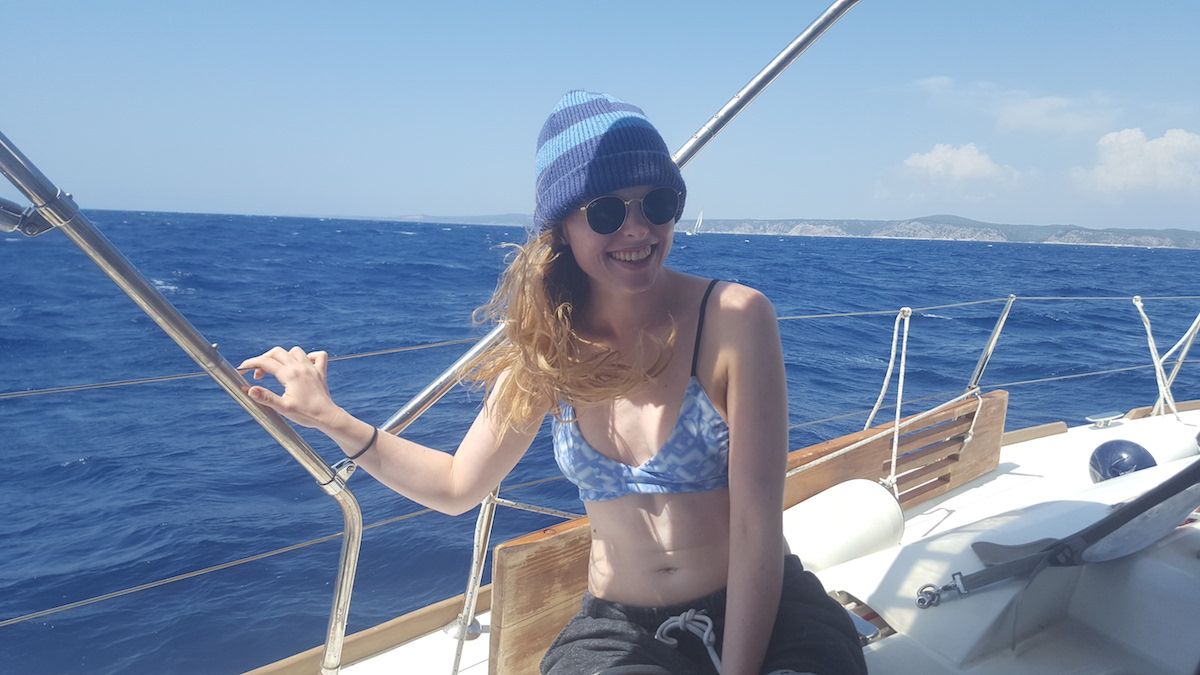 Winter cap & bikini, perfect sailing match
Winter cap & bikini, perfect sailing matchBe fashionable :) - Although we strongly encourage you to travel light, there is no reason not to present yourself in a proper nautical way. There is always place in the luggage for a bit of nice outfit for nights out (it can still be very casual) or for enjoying on the deck. Everybody around will certainly appreciate.
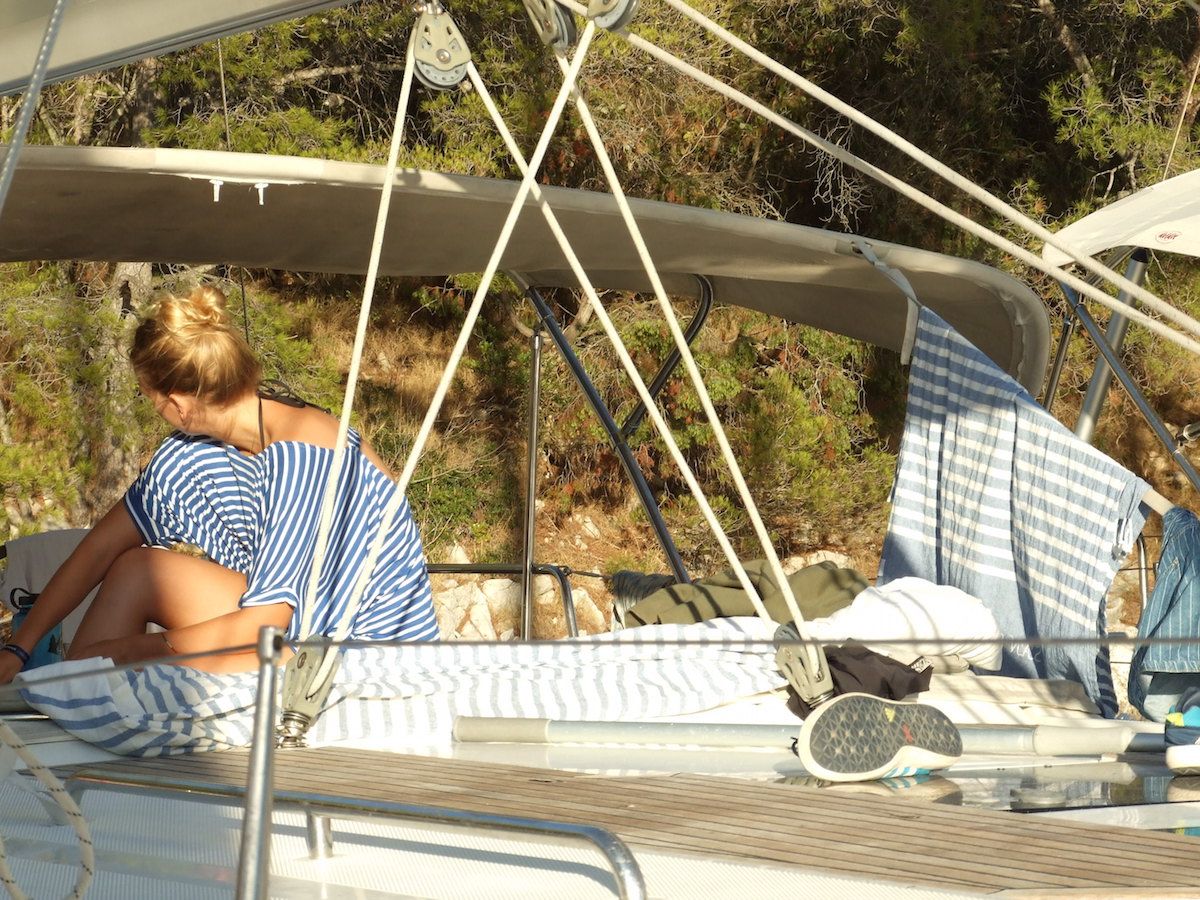 Matching stripes and colours
Matching stripes and coloursBook on time - If you are interested in any additional activity, sea or land based, like diving, driving a scooter, being guided by a local guide or else, please make sure you make an inquiry on time (and take note of the dates, times, schedules), or inform us to do so. Some of them have limitted available spots, others can be sold quickly...more than often, last minute bookings turn to be complex, if not impossible...
Communicate with the skipper - Besides many useful yachting related advices, you will also be informed on locations, plans, weather forecast, but also on small tricks on how to have your stay even more pleasurable. Do not hesitate to ask for any detail you would like to find out about. Also, if any request of the skipper is not clear enough, feel free to ask to be repeated as many times as necessary. Better safe than sorry...
Covid
If you are allowed into Greece, you are fine sailing with us. The skipper is vaccinated, others do not have any legal obligation to do so (MAYBE IT WILL CHANGE?!?). However, for the tranquility of the others, informing us all on your status previous to your coming would be nice. During the trip, no mask is mandatory on the yacht, but it is so whenever we enter shops, visit enclosed places...After the trip, please plan in advance where and how you should do your rapid or PCR test for further travels, if needed.